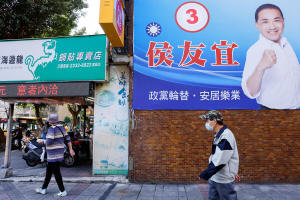Disputes over China ties sour Taiwan election campaign
 Send a link to a friend
Send a link to a friend
 [January 02, 2024]
TAIPEI (Reuters) - Bitter disputes on how to handle
relations with China and avoid conflict are dominating the final stretch
of election campaigning in Taiwan, as some polls show a tight race
between the main two contenders to be the island's next president. [January 02, 2024]
TAIPEI (Reuters) - Bitter disputes on how to handle
relations with China and avoid conflict are dominating the final stretch
of election campaigning in Taiwan, as some polls show a tight race
between the main two contenders to be the island's next president.
The Jan. 13 presidential and parliamentary elections are taking place
against a backdrop of increased pressure from China as Beijing seeks to
bolster its sovereignty claims.
As the vote has approached, China has accused Taiwan of unfair trade
practices and ended some tariff cuts, while China's military has
continued to fly over the Taiwan Strait.
Both China and Taiwan's largest opposition party the Kuomintang (KMT)
have framed the vote as a choice between war and peace.
The ruling Democratic Progressive Party (DPP), whose presidential
candidate Lai Ching-te has led in the polls, has attacked the KMT as
being Beijing's patsies and for parroting China's line that the DPP
threatens peace.
"I tell you all, it is internationally accepted that the risk comes from
the Chinese Communist Party, not Taiwan, not the DPP and not Lai
Ching-te," Lai's running mate, Hsiao Bi-khim, told the KMT's vice
presidential candidate, Jaw Shaw-kong, at a televised debate on Monday.

The KMT says DPP leaders are dangerous supporters of Taiwan's formal
independence. Lai says he will maintain the status quo and has no plans
to change Taiwan's official name, the Republic of China.
Jaw, a fiery media personality, told Hsiao, previously Taiwan's
high-profile de facto ambassador to the United States, that in the last
eight years of the DPP being in charge it had taken Taiwan to the brink
of war.
"It's true, the whole world is paying attention to Taiwan, but what are
they paying attention to? Whether or not there will be war in the Taiwan
Strait. What's brought that? The DPP's policies," he said.
President Tsai Ing-wen and Lai have repeatedly offered talks with China
but have been rebuffed, as Beijing believes they are separatists.
The KMT, which favours closer ties with China but strongly denies being
pro-Beijing, says it, like the DPP, will keep boosting Taiwan's defences,
but re-engage with China and oppose Taiwan independence.
Both parties say only Taiwan's people can decide their future.
[to top of second column]
|

People walk past a campaign ad for Hou Yu-ih, a candidate for
Taiwan's presidency, from the main opposition party Kuomintang (KMT)
ahead of the presidential election in Taipei City, Taiwan January 2,
2024. REUTERS/Ann Wang

POLLS TIGHTEN?
New opinion polls cannot be published after midnight on Wednesday,
and some have put the KMT's Hou Yu-ih within spitting distance of
Lai.
A TVBS poll conducted Monday put Lai at 33% with Hou at 30% and
former Taipei mayor Ko Wen-je of the small Taiwan People's Party at
22%. ETtoday on Tuesday put Lai at 38.9%, Hou at 35.8% and Ko at
22.4%.
Some polls have given Lai a much more commanding lead, including one
by My Formosa on Saturday that put him 10 points ahead of Hou, a
similar result reported by mnews on Monday.
Also at stake is the legislative election; the DPP has a majority in
the legislature.
Polls have pointed to no party getting more than 50% of the seats,
meaning no matter who wins the presidency, they will have to work
with other parties to get legislation passed.
Here, too, the DPP is targeting China, running a television
advertisement warning that the KMT's Han Kuo-yu, who lost badly to
Tsai in the 2020 presidential election and is running for a
legislative seat, could end up as parliament speaker.
"He most likes going here," the advert says, showing a picture of
the Chinese government's liaison office in Hong Kong, which Han
visited in 2019 before his candidacy was announced.
Hou says efforts to paint him and the KMT "red" - the colour of
China's Communist Party - and portray them as pro-China are a nasty
smear.
"During the election, I'm painted red every day, and said to be
pro-China. But aren't peace, exchanges and dialogue across the
Taiwan Strait something that should be done?" he said at a
presidential debate on Saturday.
(Reporting by Ben Blanchard. Editing by Gerry Doyle)
[© 2023 Thomson Reuters. All rights
reserved.]This material
may not be published, broadcast, rewritten or redistributed.
Thompson Reuters is solely responsible for this content.
 |